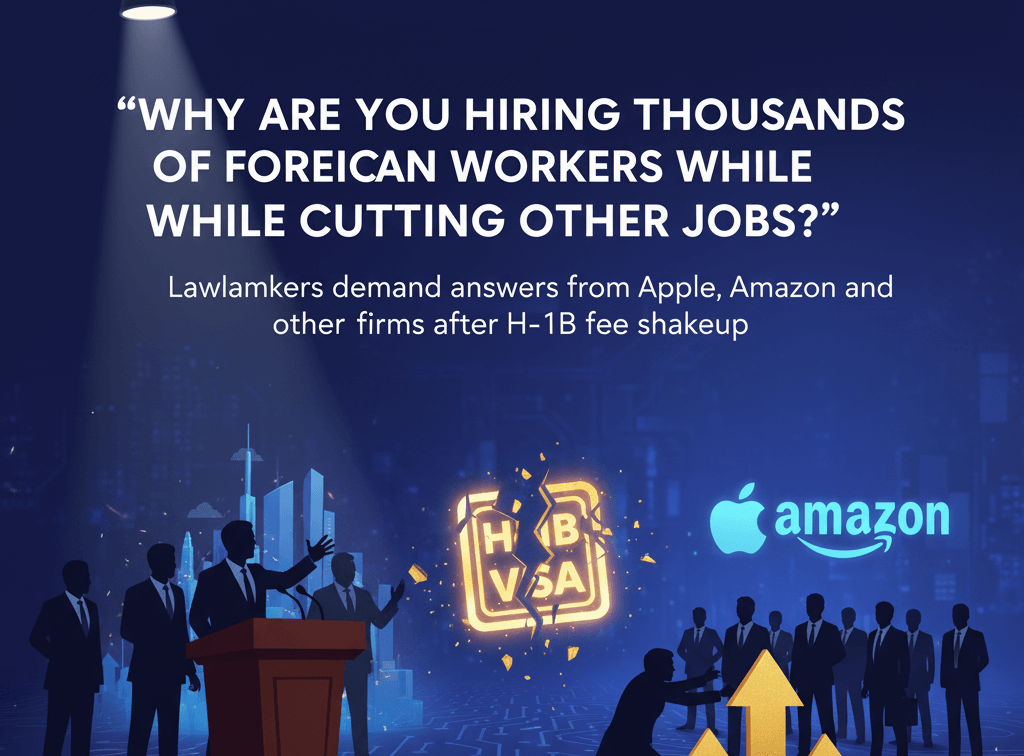Washington — Two senior U.S. senators have asked major American corporations — including Apple, Amazon and several other big tech and finance employers — to explain why they continue to hire large numbers of H-1B visa workers even as the same companies have been cutting jobs at home. The letters, from Judiciary Committee Chairman Chuck Grassley (R-Iowa) and Ranking Member Dick Durbin (D-Ill.), ask for detailed data on H-1B hiring, wages and whether U.S. workers have been displaced.
The letters landed in the context of a dramatic shift in Washington policy. The administration’s proposal — widely reported and discussed on Capitol Hill — would sharply raise fees for H-1B petitions and reprioritize the program toward higher-paid, higher-skilled applicants, a move that has roiled both employers and foreign workers. Lawmakers say they want to know how companies’ hiring decisions square with recent layoffs affecting U.S. employees.
Who was asked and what the senators want Grassley and Durbin’s inquiries have been sent to a wide list of employers that are among the largest H-1B sponsors: Amazon, Apple, Microsoft, Meta, Alphabet (Google), JPMorgan Chase, Deloitte, Cognizant and Tata Consultancy Services are among those reported to have received letters. The senators requested the number of H-1B employees, their job titles, starting dates, annual compensation and whether U.S. workers were displaced or had applied for roles that were filled by H-1B holders. Companies were given a deadline to respond.
Snapshots of the scale The scrutiny follows reporting that some firms continue to bring in thousands of H-1B workers even while enacting layoffs in other parts of their businesses. Reuters and other outlets have cited government data and filings showing large H-1B approval counts for top sponsors in 2025 — for example, Amazon and its cloud unit have been among the largest recipients of new approvals.
Industry and political stakes For corporate legal and HR teams, the inquiry raises immediate compliance and reputational concerns. Critics argue that continued reliance on foreign talent during rounds of domestic job cuts undercuts public claims that companies are prioritizing American workers; company officials counter that H-1B hires often fill highly specialized roles that are difficult to staff domestically. Several outlets report that many companies either have not publicly responded to the letters or are reviewing the requests with counsel.
The wider policy picture — and a key clarification The current policy debate is complicated by an administration move that would impose a very high fee on new H-1B petitions — figures like $100,000 per petition have been reported — prompting anxiety in industry and among visa holders. At the same time, the White House has sought to clarify that proposed fee changes would not retroactively apply to existing H-1B holders, a point intended to ease immediate travel and employment worries for people already in the U.S. on H-1B status.
What comes next Lawmakers’ letters typically carry investigative weight: firms may be asked to provide documentation that will be used by committees to assess whether legislative or regulatory fixes are warranted. Companies that receive the letters now face a choice between a detailed, transparent reply and a narrower legal response that protects proprietary hiring data. Observers say the episode will likely intensify debate on the future of high-skilled immigration, corporate hiring practices and whether program rules need reform to better protect domestic workers.










